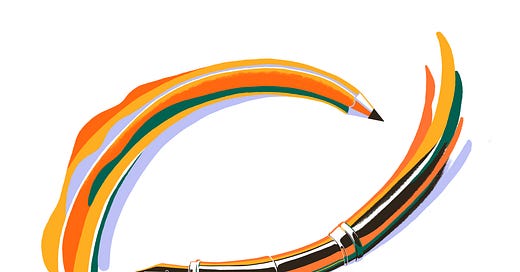Introducing Substack Letters
Before there was email, or Twitter, and long before the internet arrived to swallow the world—there were letters.
Dear readers,
Before there were Twitter fights or YouTube debates, there were letters—and it’s an art we are intent on reviving. At the bottom of this post is a list of recent letter-based conversations that have been happening on Substack. We hope you’ll consider starting one, too.
The first handwritten letter is thought to have been sent by the Persian Queen Atossa in around 500 BC, back when only a tiny fraction of the population was literate. As our ancestors expanded across the globe, the letter soon became our primary mode of long-distance communication and would remain as such for centuries.
I’m old enough to recall being taught how to construct a handwritten letter. Mine may have been the last generation of schoolchildren to learn this. Perhaps it is always the fate of formal education to prepare children for a world that is vanishing before their eyes, but the pace of change never felt more apparent than at the end of the twentieth century. As the internet expanded into every home, it quickly became clear that we had arrived at a unique inflection point.
The internet promised to help us to both celebrate our differences and transcend them, by recognizing each other’s shared humanity. This, combined with the unparalleled access to knowledge it offered, was to make hitherto undreamed-of intellectual explorations and discoveries possible.
But our new tools also made it easier than ever to retreat into echo chambers, where we are encouraged to define ourselves not by what we believe in, but by who our enemies are. We have entered a post-truth era—not because we lack information but because, amid the cacophony of partisan voices, it has become so difficult to distinguish truth from fiction.
So, how can we find a better way to converse? Ancient Greece can offer a model. Socrates was perhaps the first to introduce the dialectic method, in which people with opposing views debate each other. Through the clash of ideas, both parties’ views were stress-tested, errors were discarded, and the interlocutors ended up closer to the truth.
But, though it’s widely acknowledged that Socratic debates are a vital means of truth-seeking, we rarely encounter vigorous but honest conversations of this kind in writing anymore.
Amid the constant hum of short-form content and daily news cycles, letter writing has become a relic.
Yet there is something special about a written dialogue. As
, once put it: “The one-on-one letter exchange—even in a public, digital format—is ideal for forming, expressing, and presenting ideas, can heal rifts and promote mutual understanding and enrich the wider discourse. The genre itself encourages an approach to knowledge and relationships that is uniquely valuable.”When two people debate on a podcast, they only have a few seconds to respond to each other’s arguments. In a letter exchange, both parties have days or even weeks to forge their strongest viewpoints and—crucially—to fully consider their interlocutor’s perspective.
Here at Substack, we want to revive the Socratic tradition by bringing thoughtful writers together in online letter exchanges.
and launched this initiative with a conversation on Free Speech and Cancel Culture. For Parker, this has been a refreshing experience: “an attempt at an actual exchange of ideas that doesn’t leave both parties feeling like they’re pounding nails into the floor with their forehead”; while, for Freddie, such collaborations can introduce writers to new audiences and expose readers to new ideas. “[I] hope that there’s some cross-pollination between my readership and yours,” he tells Parker, since “you can’t be open-minded or independent unless you’re frequently consuming writing that drives you crazy.”We’ve already hosted a number of challenging, enriching conversations here on Substack. If they don’t drive you crazy, perhaps they may drive you sane:
- & On Free Speech and Cancel Culture.
- & On Europe’s Strategy in Ukraine.
- & On Feminist Causes, Alliances, and Free Speech.
- & On Trump, Trumpism, and the End of Our World.
- & On Cancel Culture is a Myth
- & On Is the Middle East ready for democracy?
While conversations that attempt to scrutinize truth claims are important, I’m equally excited about letter exchanges that are exploratory and meandering. My hope is that by highlighting the potential of letter writing in a public digital space, new use cases will emerge from within the Substack writer community.
If you share the same curiosity, you can start a correspondence today. Read our guide on how to get started.
Yours truly,
Clyde






This is very interesting. During the pandemic I had started an "email friendship" group based on the very premise that people nowadays are pressured into answering texts right away, and if they go unanswered for days for God knows what reason, you are immediately deemed a bad friend. But life gets busy, and sometimes it's nice to be caught off guard by good narratives.. so good job!
Seems like a genuinely good thing for discourse. Excited to see how people use it.
Edit: I’m already coming up with ideas for my own publication. If anyone here is interested in correspondence, let me know!